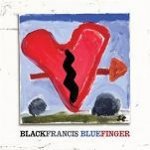
Black Francis Bluefinger
(Cooking Vinyl)
Bluefinger is the first recording credited to Black Francis in about 15 years - the name has been virtually redundant since the Pixies 1992 swansong Trompe Le Monde, and fittingly so given Charles Thompson IV's wild directional and musical swings. This latest release, however, fits comfortably alongside that album's Nirvana-esque U Mass, or Debaser's frenetic chord progressions as some of the man's most aggressive and upfront music.
Black Francis, aka Charles Thompson, aka Frank Black has put his hand to pretty much everything in the last twenty years: he's created some of the most cerebral alt.rock ever recorded to tape with the Pixies, reinvented space-age alt.pop as a solo artist and spent a significant chunk exploring minimal recording techniques to recapture a more halcyon age of rock'n'roll. Most recently he's worked with Steve Cropper, Penn & Oldman et al on Honeycomb and Fast Man/Raiderman - these latter received more warmly by the ageing broadsheet critics than the hip young things. Yet despite serious misgivings, you go out of your way to forgive Black his occasional indiscretions. Quite simply, for me - and many others - Frank Black came to represent something higher than ordinary music - he was to grunge what Tom Waits was to today's singer songwriters, or what Led Zeppelin was to Jack White: A little bit frightening, and nothing remotely attainable, but something to inspire and push one on.
Which is why the 'Nashville' albums, although they had their moments, were generally disappointing - they could quite easily have been done by, well, anyone. Bluefinger on the other hand... Where could Frank Black go from lovelorn country? Why, by recording a sonically brutal concept album about - quite literally - sex, drugs and rock'n'roll, as epitomised by the life of Dutch artist/musician Herman Brood. As role models go, Brood is up there with Sid Vicious and GG Allin, but he's inspired a record that recaptures Black's former glory and arguably exceeds good chunks of it. The menacing bass pulls you straight in to opener Captain Pasty, before the carefully-voiced chords entice you into lead single Threshold Apprehension, which continues in a way in which the likes of Bloc Party would be quite jealous. All angular and muscular it's a great single, despite its lengthy intro. More importantly it reintroduces, after a gap of too many years, Black's legendary howl - that scream so monstrous on Caribou - it's back, and it's thrilling.
It's kind of tricky trying to highlight standout tracks, as each appeals in its own right, and for different reasons. However, Angels Come To Comfort You deserves a mention for it's awesome, ghostly codetta, and although the idea of a man of Frank Black's, um, stature singing about Tight Black Rubber may not appeal at first, the half-spoken lyrics over the churning bass will certainly draw you in.
Black is as lyrically dextrous on Bluefinger as he's ever been, particularly on the aforementioned Angels..., probably the most explicit track on the subject that the album contains. Starting as a country boogie that would have been at home on his 2001 album Dog In The Sand, it describes Brood's trajectory from "West Berlin to West Hollywood," and how he was "prettier than Brando, he was punker than punk / slave to rock'n'roll and a slave to junk." The track ends after a protracted outro in a sombre siren tone, halfway between an ambulance and a heart monitor, not before referencing John and Yoko's stay at the Amsterdam Hilton in room 902, the same from which Brood himself fell/jumped to his death - the angels coming "to break your fall" playing against Captain Pasty's "please report to the tarmac for a very important assignment." It's all very dense, and as fascinating to unpick as Dylan's quasi-religious mumbles or Waits' lysergic apocalypses.
Veering in snarling seconds past Brood's own smack anthem, You Can't Break A Heart And Have It and the almost lurid Your Mouth Into Mine, one is initially left with the distinctly unsettling impression that is the Black household bedroom album, featuring as it does his new wife Violet on backing vocals. Fortunately, keeping the themes and lyrics in mind dispels this and one is able to concentrate again on what is a really outstanding body of work. It's deep and complex, yet musically immediate - the production causes the instruments to jump right out of the speakers. It's far and away the finest record Frank Black has produced in a long time, and shows that it's time for the old pretenders to show the new pretenders a thing or two about writing a rock song.
4 September, 2007 - 18:44 — Simon Briercliffe